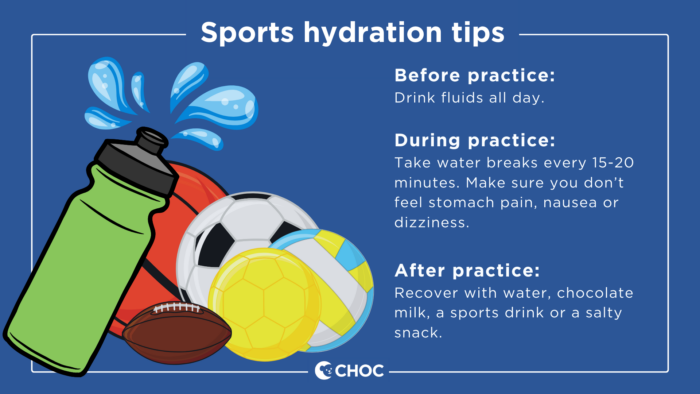When temperatures heat up, the risk of children becoming dehydrated intensifies. For young athletes, this risk is even greater during hard sport practices and games.
If your child plays sports, there are some key suggestions that coaches and caregivers can share to keep them hydrated, healthy and in top-performance shape, says Dr. Chris Koutures, pediatrician and sports medicine specialist at CHOC.
Here, Dr. Koutures offers tips for parents and caregivers to help their child stay safe and hydrated while playing sports.
Signs of dehydration in young athletes
“Dehydration occurs when an athlete has less body fluid than they need,” says Dr. Koutures. “That can be from not getting enough fluids at the start of practice or excessive sweating or vomiting.”
Here are some tell-tale signs of thirst and dehydration in young athletes:
- Decreased attention.
- Complaints of stomachaches.
- Vomiting.
- Dropping to one knee.
- Fever.
When dehydration sets in, “you’re going to see kids not be as energetic,” explains Dr. Koutures.
If you suspect your child is dehydrated, get them in the shade and make sure they are alert. Then, cool them down with ice packs and have them sip small amounts of fluid, if they can.
If your child is dehydrated, they need to rehydrate — which means that they need to replace the water they lost along with salt and sugar. They can rehydrate by regularly drinking small amounts of liquids.
Mild dehydration can often be treated at home. If your child shows severe signs of dehydration, call your doctor. If your child is very sleepy or unresponsive, call 911 or head to your local emergency department immediately.
Preventing dehydration in kids before practice or game day
Preventing dehydration is all about preparation.
“In the days before a sports practice or activity, make sure kids get plenty of fluids and water-rich fruits and veggies, like watermelon and berries,” says Dr. Koutures.
A good rule of thumb is to have your child drink fluids before practice or a game. One recommendation is that kids should drink 12 to 18 ounces before physical activity and 5-9 ounces of every 15 to 20 minutes throughout. That means, your child should be taking a fluid break every 15 to 20 minutes throughout practice and games.
During these fluid breaks, the American Academy of Pediatrics (AAP) recommends that kids and teens drink the appropriate amount of water for their bodies, like:
- 5 oz. for an 88-pound child every 20 minutes.
- 9 oz. for a 132-pound adolescent every 20 minutes.
They also should drink fluids after exercising to restore fluid lost through sweat.
Caregivers and coaches should keep an eye on kids who may be at higher dehydration risk, including those who may have just gotten over a cold or are overweight. You’ll know your child is hydrated enough if their urine is clear. If not, it will be the color of lemonade.
Get more advice from CHOC: How much water should kids drink?
Is water good enough for hydration for kids?
Before sports practice or game day, kids should hydrate with water. However, some kids simply don’t like the taste of water. If your child won’t drink it, flavored beverages are acceptable.
After sports, kids and teens should hydrate with water. Many sports drinks are available, but plain water is usually enough to keep kids hydrated. Kids should avoid sugary drinks, energy drinks and carbonated beverages that can upset the stomach. Low-sugar sports drinks can be a good choice for kids who do intense physical activity for more than one hour.

 Print or download this hydration tip sheet your young athletes
Print or download this hydration tip sheet your young athletes
“My favorite recovery drink is chocolate milk,” says Dr. Koutures. “It has carbohydrates, protein, vitamin D and calcium.”
For kids younger than 5 years, water is best for recovery, but drinks like Pedialyte are good, too. Kids and teens should also eat a salty snack along with their water during recovery. This makes sure that their body is replenishing the salt it lost while sweating during exercise.
Is it possible to over-hydrate during sports?
An athlete can over-hydrate or consume high amounts of water without proper sodium replacement, which puts the body at risk for hyponatremia.
Hyponatremia is a condition that occurs when the level of sodium in the blood is too low, which can cause nausea, headache, confusion and fatigue. If an athlete weighs more after exercise than before, then the athlete is consuming too much fluid. Get more hydration tips from a CHOC dietitian.
With these important hydration reminders, your young athletes will be ready for a safe and successful sports season. Make sure they remember to hydrate before, during and after their practices and games.
For more health and wellness resources from the pediatric experts at CHOC, sign up for the Kids Health newsletter.
Find a CHOC Primary Care Pediatrician
From babies to teens, pediatricians from CHOC’s Primary Care Network partner with parents to offer immunizations, sick visits, sports physicals and more.





